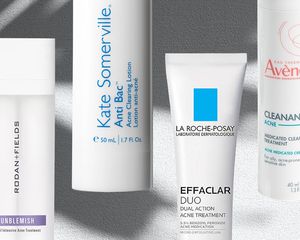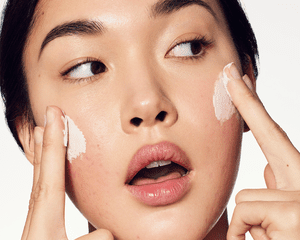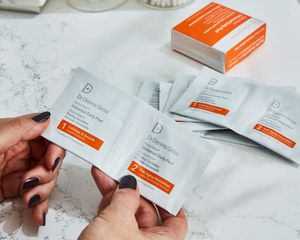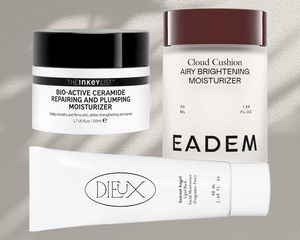:max_bytes(150000):strip_icc()/USED_hydrogen-peroxide-for-acne-1974-ba2240de231545ea9ba2093d2f2cc9c8.jpg)
Tawni Bannister for BYRDIE
We know the feeling all too well: You've picked at a whitehead that you shouldn't have, and now you're scrounging through your medicine cabinet to find something—anything!—to help your current situation. One item you might come across in the product graveyard under your sink is the instantly recognizable brown bottle of hydrogen peroxide. Among its many hacks and alternative uses (DIY hair highlights, anyone?) is hydrogen peroxide's rumored ability to dry up a pimple in a pinch. But if the solution is the, well, solution to all our pimple problems, why isn't it one of the main acne-fighting ingredients we often hear about? To get to the bottom of this and find out what we experts think of using hydrogen peroxide for acne, we consulted board-certified dermatologists Neal Schultz, MD, of Park Avenue Skincare, and Julie Russak, MD, of Russak Dermatology Clinic as well as cosmetic chemists Victoria Fu and Gloria Lu of Chemist Confessions. Before you go soaking your face in hydrogen peroxide in the name of good skin, you might want to read the below.
Meet the Expert
- Neal Schultz, MD, is a board-certified dermatologist at Park Avenue Skincare.
- Julie Russak, MD, is a board-certified dermatologist at Russak Dermatology Clinic.
- Victoria Fu and Gloria Lu are cosmetic chemists at Chemist Confessions.
What Is Hydrogen Peroxide?
If you ever skinned your knee as a child, you've probably come into contact with the often dark plastic bottle filled with the fizzing liquid. According to Lu, hydrogen peroxide (H2O2) is a reactive molecule that is used for many different purposes, and it’s considered an antiseptic agent used in wound cleaning. Hydrogen peroxide is produced artificially and doesn’t occur naturally. Russak says it works by creating free oxygen radicals, so it kills bacteria. "Part of it is removing that residual bacteria that promote inflammation and prevent healing, but part of it is really the oxygenation of the skin that maintains fibroblast activity, which is a cell that promotes wound healing," Russak explains.
Hydrogen Peroxide
Type of Ingredient: Antiseptic agent
Main benefits: Kills bacteria, heals wounds, dries pimples.
Who should use it: Those who are younger and have a whitehead or a bacterial infection in an acne cyst.
How often can you use it: Russak recommends using it up to twice a day on a pimple for no longer than two consecutive days.
Works well with: No ingredient in particular.
Don't use with: Schultz says you shouldn’t use it with benzoyl peroxide because of the added irritant effect. (Though if you’re using conventional ingredients for acne, you wouldn't need to bother with hydrogen peroxide.)
One important trait to note: It breaks down quickly with air. If the bottle’s been in your medicine cabinet for six months, there’s a good chance it’s no longer effective. Schultz says the way to test it is to pour a little out and see if it’s still bubbling. If not, that means the extra oxygen has escaped, and it's time to replace that bottle.
Hydrogen Peroxide for Acne
Fu says aside from being an antiseptic for cuts and scrapes, hydrogen peroxide has been studied as a potential aid in treating acne. An older 2003 study showed that a 1% hydrogen peroxide cream was as effective as and less irritating than a 4% benzoyl peroxide solution. "But these studies use a lipid-stabilized version under the product tradename crystacide and is not the same as buying a jug of hydrogen peroxide at the drugstore," Fu says.
So what about regular OTC bottles of hydrogen peroxide? According to both dermatologists, the occasional use of the solution in the diluted form (3%) as a spot treatment may help dry out a pimple, but it's far from an end-all, be-all treatment. For one, it would only theoretically work on inflammatory acne (red pimples or pus pimples) and would likely not have any effect on cysts, which are too big and too deep, or blackheads.
Secondly, Russak stresses that you shouldn't rely on hydrogen peroxide as your regular, primary acne treatment. Think of it as a short-term solution, like putting on a bandage.
"You always have to know what is the underlying cause of the acne," Russak explains. "There’s a lot of different sources for causing acne depending on the location, depending on what’s happening internally with the skin. If hormones are your primary cause of underlying acne, then using hydrogen peroxide longterm will give you no benefit whatsoever."
Fu agrees that hydrogen peroxide, even at 3%, can be too strong for repeated treatment. "It’s important to remember that when dealing with acne, your skin is already under fire," Fu says. "Potentially adding additional irritation will only make the road to healing more difficult."
The final verdict? Lu and Fu recommend traditional acne-fighting ingredients (salicylic acid, benzoyl peroxide, or adapalene) over hydrogen peroxide. Russak and Schultz agree that the only scenario where it would make sense to use hydrogen peroxide as a spot treatment is if you're in a pinch. As Schultz explains, "If it’s three hours before a date, and you can’t run out, and you’ve got nothing in the house except hydrogen peroxide, can you dab it on just to try to shrink it and dry it up a little bit? Sure, you can."
How to Apply Hydrogen Peroxide
Schultz strongly advises against applying a hydrogen peroxide spot treatment on your face every night to help prevent and treat acne, but if you're stuck and have nothing else, it can work—but only on rare occasions.
To apply it, Russak recommends dipping a cotton swab in the diluted hydrogen peroxide, then putting it precisely on the whitehead, being careful not to spread it on the surrounding skin. Hold it on the area for no more than five seconds. "You just want to deposit the hydrogen peroxide there, and you’ll see the oxygen bubbling—that’s enough," Russak says. Apply the hydrogen peroxide up to twice a day for no longer than one or two days in a row. If you don’t see a result or improvement in that time, discontinue the use of the ingredient and visit a dermatologist to assess the situation.
Hydrogen Peroxide vs. Benzoyl Peroxide
As one of the most effective OTC ingredients for acne, you've likely heard of the topical antibacterial benzoyl peroxide. So how is it different from hydrogen peroxide? "Other than both having a peroxide group, making them both fairly unstable molecules, they don’t really have many similarities," Lu says.
For example, benzoyl peroxide is lipid-soluble, which means it coats the skin and doesn't absorb into it, while hydrogen peroxide, on the other hand, is water-soluble.
When it comes to benzoyl peroxide vs. hydrogen peroxide as a treatment for acne, there is no comparison. If you’re going to use something that's nonprescription, Schultz's recommendation is to use something that has a track record of efficacy and known side effects (aka benzoyl peroxide, in this case).
Side Effects
At this point, you might be thinking, "A cheap, effective spot treatment for whiteheads—what's not to like?" But it's the side effects of hydrogen peroxide that give dermatologists pause.
"The peroxide (the extra oxygen) is damaging, and it tends to kill bacteria, but it also kills good skin," Schultz explains. "All peroxides can be damaging because they’re not selective in what they oxidize." In other words, hydrogen peroxide is not very focused in the damage that it does.
At stronger concentrations, hydrogen peroxide can burn the skin, but when using the diluted kind available over the counter (3% hydrogen peroxide), you risk damaging, drying, or inflaming the skin, as well as bleaching it, which is why neither Russak nor Schultz recommends it for those with darker skin tones. "Potentially, it can even out if you’re leaving healthier cells behind, but if you’re holding the hydrogen peroxide for a long time and you’ve killed the melanocytes, which are the cells that produce that pigment, then it could be a permanent problem," Russak warns.
Additionally, Russak doesn't recommend hydrogen peroxide for her older patients. "Younger teenagers have a high concentration of P. acnes on their skin, so that’s why hydrogen peroxide or benzoyl peroxide—which have antibacterial properties—are a better treatment for them," Russak explains. "As we grow older, why we breakout is completely different, and it has nothing to do with bacteria, so using a treatment that is potentially antibacterial is not good."
But what really has Schultz concerned is the lack of research on the side effects. "Nobody has tested hydrogen peroxide in a formal setting to see the damage that it could do," Schultz says. "We know it anecdotally, but we don’t know it by medical studies."



